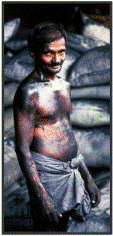Human Trafficking, Interdisciplinary Conference on

Annual Interdisciplinary Conference on Human Trafficking: 6th (2014)
Date of this Version
5-2014
Document Type
Article
Abstract
Focusing on street-working boys in Sihanoukville, this study partnered with social workers and child protection officers from M’lop Tapang (a key social service provider in Sihanoukville) to identify locations where young boys were known to be working along the beaches and within the town center. In recent years, Sihanoukville has become known as a rapidly developing commercial beach area, which has received increasing attention from foreign tourists, backpackers, and ex-patriots. Within this context, it has become a destination for migrant workers from surrounding provinces who have hopes of generating income through selling, begging, and other various means. The study conducted 56 in-depth interviews with street-working / street-living boys presently working along the streets and/or beaches in the Sihanoukville area, focusing on a number of key areas including: demographics, social and family relationships, financial security, sexual history, instances of violence and sexual abuse, health, emotional wellbeing, and future plans. This study aims to provide a baseline of information and broad analysis of the key needs, vulnerabilities, and potential resiliencies of street-working boys in the Sihanoukville area in order for NGOs and social service providers to better understand them and provide them with adequate services. The research found a high percentage of street-working boys (38%) who disclosed instances of being touched sexually by an adult during their work on the streets. In addition to this, slightly more than one-fourth of boys (26%) disclosed instances of sexual abuse that went beyond just touching, many citing forced and coercive sex. In addition to sexual abuse, 26%, of street-working boys disclosed various forms of ‘sex work’, or times when they had either solicited or been offered food, gifts, or money to provide sexual services to adults. The research also explores the impact of sexual abuse on the emotional well being of this group, including issues of shame, guilt, and suicidal thoughts. Most notably, the research found that having suicidal feelings was four times more likely among those who had been sexually touched by an adult than among those who had not. A similar phenomenon was found among those reporting sexual abuse beyond sexual touching. Most notably those who had been abused were 2.1 times more likely to report guilt, 1.9 times more likely to report feelings of low self-esteem, 2.2 times more likely to report feelings, and 3.4 more likely to report that they feel numb. Additionally, the research noted some distinct differences between boys working on the beaches and those working on the streets. In particular, drug usage, sexual abuse, receiving compensation for sexual services, and instances of rape were found to be much more common among those boys working on the streets in the town center, as compared with the boys working on the beaches.
(50 pp.)
Included in
Criminology Commons, Domestic and Intimate Partner Violence Commons, Gender and Sexuality Commons, Health Policy Commons, Human Geography Commons, Human Rights Law Commons, Immigration Law Commons, Inequality and Stratification Commons, Law and Gender Commons, Place and Environment Commons, Social Control, Law, Crime, and Deviance Commons, Social Welfare Commons, Social Work Commons

